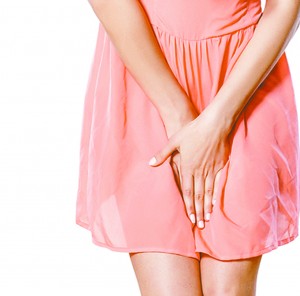 “Stress incontinence” is a reality for millions of women in America today. The “stress” is not emotional or mental pressures. Rather, it’s physical pressure put on the bladder that can cause urine leakage. Something as simple as a sneeze or a cough might trigger a leak. Standing up suddenly, lifting something heavy, exercise—sex; anything that puts pressure on a bladder can be problematic.
“Stress incontinence” is a reality for millions of women in America today. The “stress” is not emotional or mental pressures. Rather, it’s physical pressure put on the bladder that can cause urine leakage. Something as simple as a sneeze or a cough might trigger a leak. Standing up suddenly, lifting something heavy, exercise—sex; anything that puts pressure on a bladder can be problematic.
Stress incontinence is the most common form of incontinence in women. It’s an unwelcome embarrassment for 1 in 4 women aged 15 through 44—1 in 3 women aged 45 to 64. It is so embarrassing in fact, that fully two out of three women never mention it to their doctors. Those who do, wait an average of over six years before seeking help.1
The good news is, when they finally do speak up they discover that their problem is, for the most part, easily cured. Often all it takes are a few lifestyle changes—exercise, lose weight, quit smoking, forgo the diet soda refills—and voilà—no more problem! Here’s why….
The root cause of stress incontinence comes from weak pelvic floor muscles, simple as that. How you came to have those weakened muscles could be from pregnancy and/or childbirth, carrying excess weight, decreased estrogen levels due to peri-menopause or menopause, or simply aging.
So, how do you fix it?
Weight loss may be one of the most effective ways to drastically improve or even “cure” stress incontinence. According to Kristene Whitmore, M.D., chair of urology and female pelvic medicine and reconstructive surgery at Drexel University College of Medicine in Philadelphia, “Dropping pounds eases the pressure on your bladder and pelvic floor…. In one study, women who lost 17 pounds reduced leaking episodes nearly 50%. Even those who lost a mere three pounds were 28% drier.”
Also, watch what you drink—sip don’t chug—and you can also make a huge difference. Coffee is a major culprit. If you must drink it, think moderation. Water or herbal teas are better but even those need to be sipped over time. Finally, cut back or eliminate those elements in your diet that are known to irritate bladders: caffeine, carbonation, alcohol, artificial sweeteners, citrus and tomato juice.
One word—kegels! Many are already familiar with these go anywhere, exercise anytime little gems. Kegels are pelvic floor strengthening exercises. A doctor or physical therapist can show you how to perform the moves correctly to derive the most benefit. Keep at it daily for six to eight weeks to give the exercises the best chance to work.
All of the above are steps you can take to mitigate the effects of or even cure stress incontinence on your own. If those prove less than satisfactory, treatment can become more aggressive with a little help from your doctor. There are devices available he or she can prescribe to help.
A vaginal pessary is a specialized device shaped like a ring with two bumps on it. It is placed around the urethra to support the bladder and reduce leakage during activities. A urethral insert is another choice. Similar to a small tampon, it’s inserted for extra help when certain physical activities are anticipated—though it can be worn all day if desired.
Surgery is the final choice available to someone suffering from the effects of stress incontinence. There are several procedures that can be performed. Consult with your doctor to see which one he or she may recommend.
The bottom line is, stress incontinence is more inconvenient and embarrassing than it is life threatening. Clearly, there are options out there. Most are non-medical lifestyle changes a person can adopt to take control of their particular situation. Many will greatly reduce or even eliminate the problem altogether. And while stress incontinence is nothing to sneeze at…it’s not a condition you’ll have to live with, either.
Advanced Urology Specialists
855-298-CARE
advancedurologists.com
 Central Florida Health and Wellness Magazine Health and Wellness Articles of the Villages
Central Florida Health and Wellness Magazine Health and Wellness Articles of the Villages



